25 Years | 2000 - 2024
Put together imaginative programs that mix standard and unusual symphonic and choral fare . . . and you have a classical operation several cuts above anything to be found across the crowded U.S. festival landscape.
—John von Rhein, Chicago Tribune
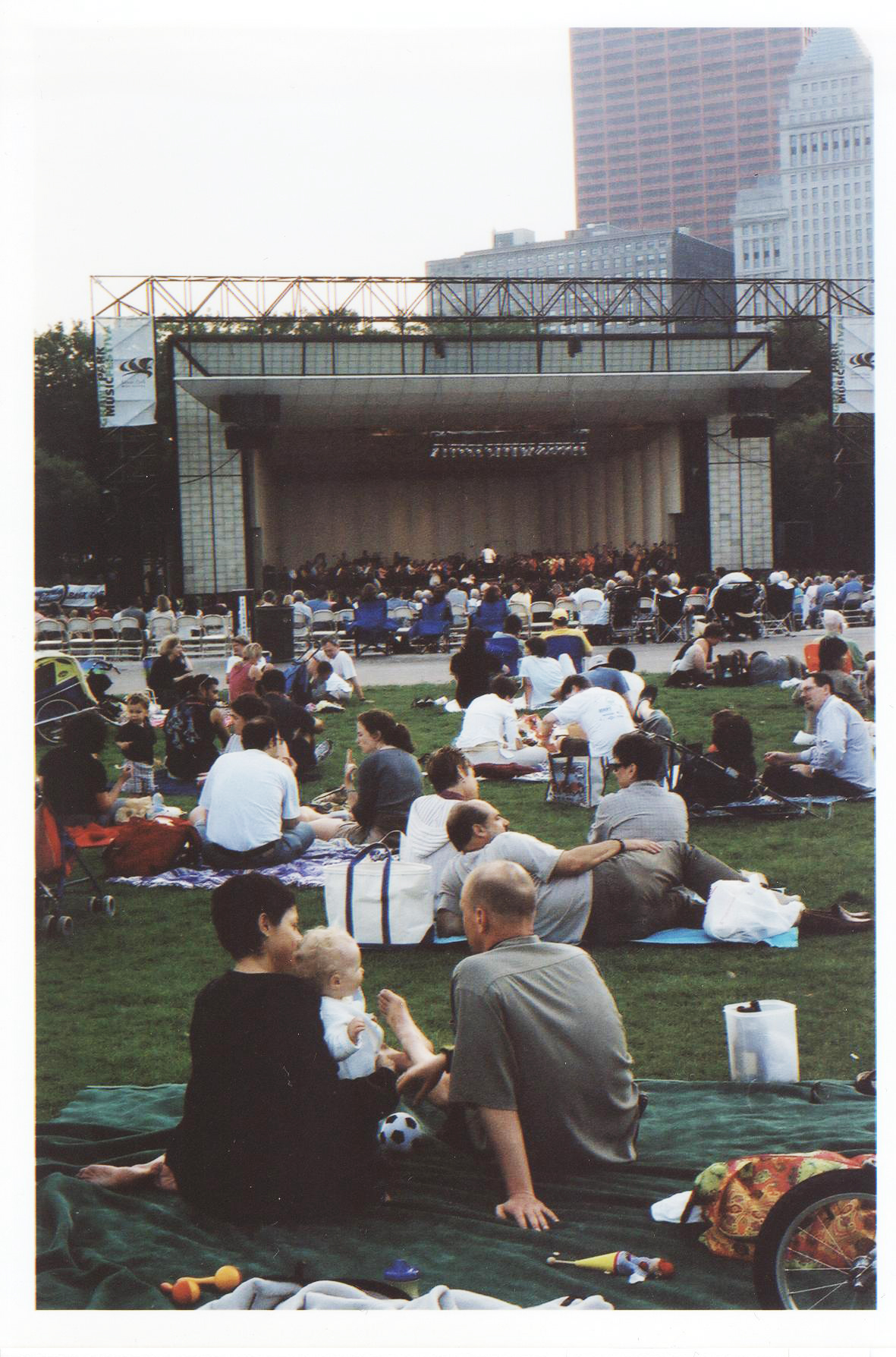 "This is cool!" exclaimed Carlos Kalmar, who had just landed in Chicago's Grant Park. The year was 1998. Hugh Wolff had recently stepped down as principal conductor, and Carlos was making his Festival debut. The timing couldn't have been better for him: He hoped to break into the American market, and the Chicago lakefront was heading for a makeover.
"This is cool!" exclaimed Carlos Kalmar, who had just landed in Chicago's Grant Park. The year was 1998. Hugh Wolff had recently stepped down as principal conductor, and Carlos was making his Festival debut. The timing couldn't have been better for him: He hoped to break into the American market, and the Chicago lakefront was heading for a makeover.
"I remember thinking, 'This is strange. Here's Orchestra Hall. And if you want to go from there to the lake, which is so pretty, you have to cross this huge gap with railroad tracks.'”
Already, plans for Millennium Park were underway.
Carlos's first concert at the Petrillo Music Shell was a whopping success. The Grant Park Orchestra gave him the thumbs-up and invited him back the following season.
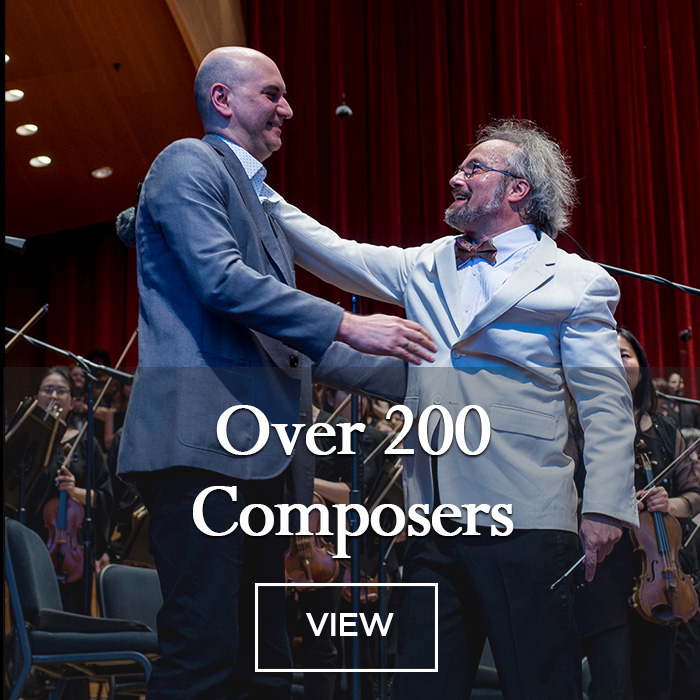 After another strong appearance, artistic and general director Jim Palermo pulled Carlos aside. He told him too many orchestras neglect American composers, and he intended to bring them to the fore. Carlos was intrigued.
After another strong appearance, artistic and general director Jim Palermo pulled Carlos aside. He told him too many orchestras neglect American composers, and he intended to bring them to the fore. Carlos was intrigued.
"I think it was very daring to hire a fairly young Austrian-Uruguayan conductor who had nothing to do with American music," said Carlos. "But I absolutely commend Jim for setting that vision and trusting me. And I was very keen on going that route."
As a candidate for the new conducting job, Carlos offered several advantages: insatiable curiosity, an adventuresome spirit, and a willingness to learn copious amounts of music. He accepted the principal conductor job in 1999. The following summer, the Chicago Tribune's John von Rhein reported, "Kalmar is pushing the repertory envelope in his first major residency in Chicago." Indeed.
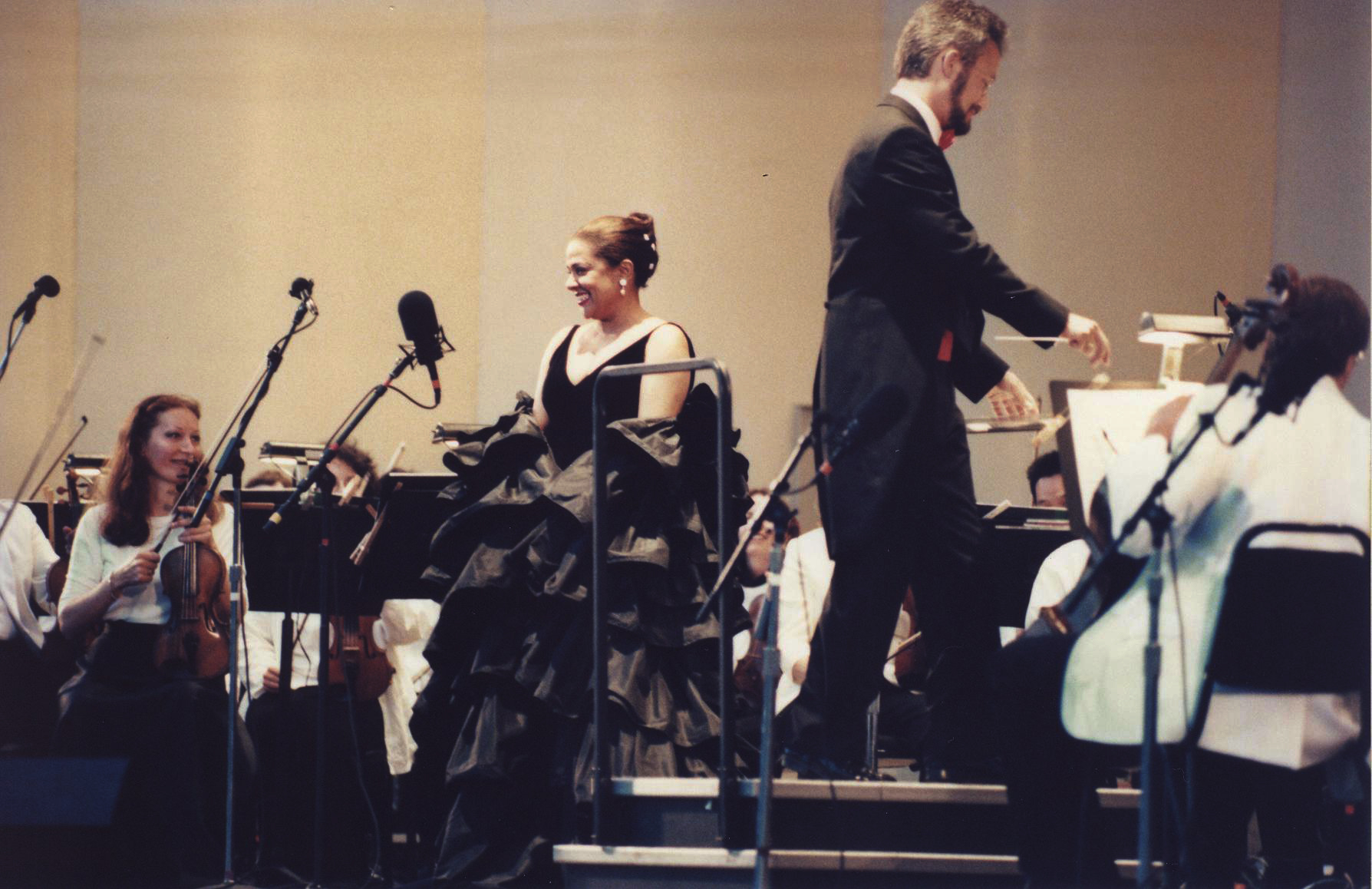 At his first concert, soprano Kathleen Battle sang a piece by André Previn. Over the course of the first season, Carlos's concerts included works by Samuel Barber, Leonard Bernstein, Aaron Copland, Michael Torke, Roberto Sierra, William Bolcom, George Walker, and John Corigliano.. He also conducted core classics by Beethoven, Ravel, Wagner, and Dvořák, as well as lesser-known works such as Kodály's Psalmus Hungaricus and Schoenberg's A Survivor from Warsaw.
At his first concert, soprano Kathleen Battle sang a piece by André Previn. Over the course of the first season, Carlos's concerts included works by Samuel Barber, Leonard Bernstein, Aaron Copland, Michael Torke, Roberto Sierra, William Bolcom, George Walker, and John Corigliano.. He also conducted core classics by Beethoven, Ravel, Wagner, and Dvořák, as well as lesser-known works such as Kodály's Psalmus Hungaricus and Schoenberg's A Survivor from Warsaw.
"There isn’t a piece we can’t tackle at Grant Park. I think and hope that the audience trusts us to choose great music, even if it is unfamiliar to them; they can be assured a stellar performance, perhaps one that will persuade them that the piece they had never heard before was really worth it."
—Christopher Bell, Grant Park Chorus Director
1999 brought another change to the Festival: a former intern named Paul Winberg returned to the organization as orchestra manager and artistic administrator.
"I got to work with Carlos his first two seasons with the orchestra," said Winberg. As a youngish arts administrator, Winberg cut his teeth on the breakneck pace of the summer festival and then left to run the Eugene Symphony. Of course, this would not be his last dance in Grant Park.
At the same time, the City of Chicago had an agenda of its own. Mayor Richard M. Daley needed the Grant Park Orchestra to become the anchor tenant for his $490 million land development—a heavy lift for the modest-sized organization.
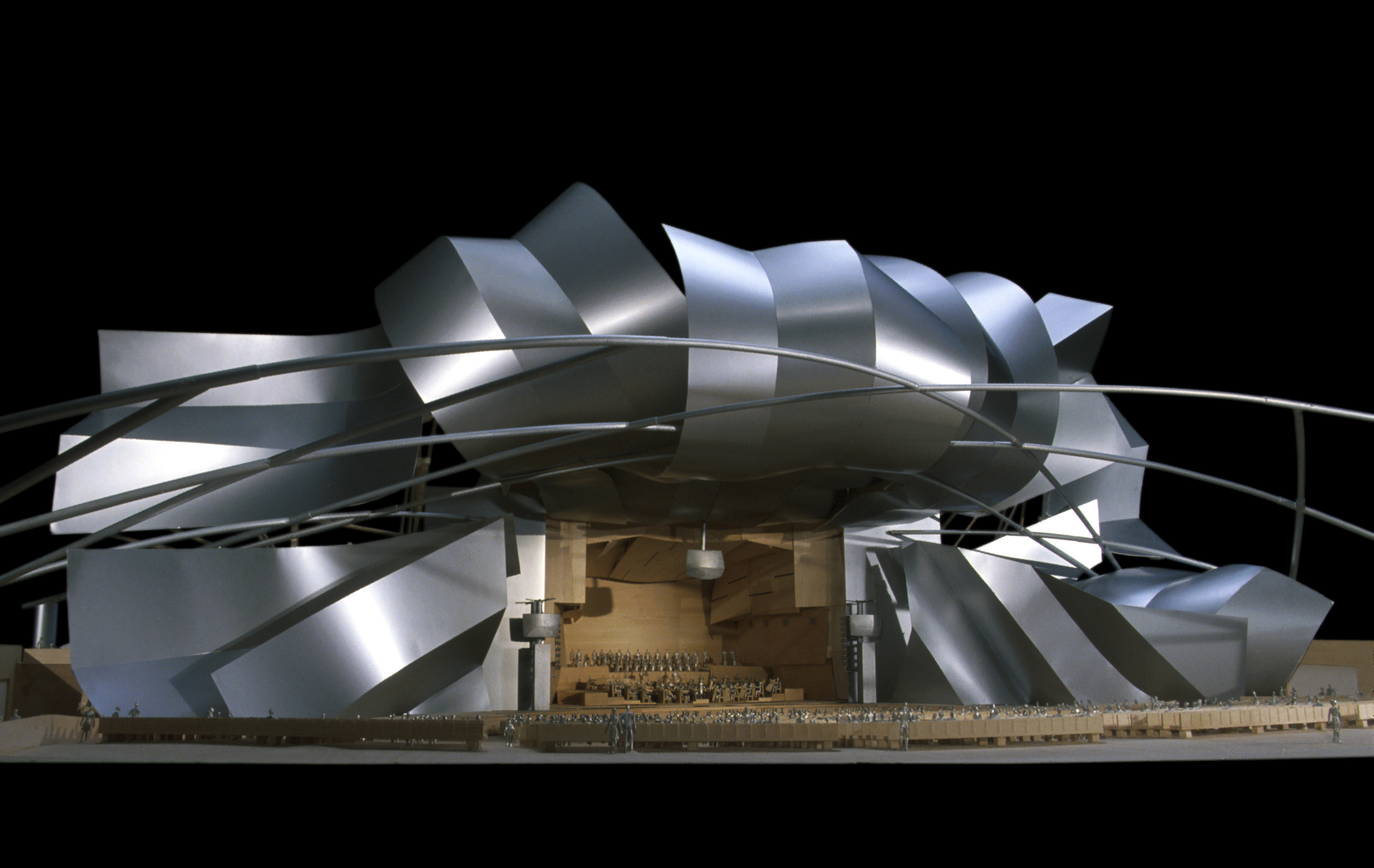 “I well remember sitting in the meetings with Frank Gehry’s team, talking about how big the music library should be, building lockers for the instruments, piano and percussion storage.” He laughs, “We were not in our element at all, because we didn’t have any of those things at Petrillo.”
“I well remember sitting in the meetings with Frank Gehry’s team, talking about how big the music library should be, building lockers for the instruments, piano and percussion storage.” He laughs, “We were not in our element at all, because we didn’t have any of those things at Petrillo.”
Lois Weisberg, the City's Commissioner of Cultural Affairs, was there to steer the Festival through its growing pains. In 2002, she convened a handpicked board of directors to establish a nonprofit organization to support the summer concert series—the Grant Park Orchestral Association.
Fast-forward to Friday, July 16, 2004; the Orchestra's brass section boomed with a fanfare by Richard Strauss as two massive glass doors wheeled apart. A gigantic ribbon fell to the floor, and 11,000 people roared. That night, Carlos Kalmar christened the Jay Pritzker Pavilion with an eclectic mix of music, including a new piece by the Pulitzer Prize-winning composer John Corigliano. Chicagoans, from the front row to the back of the lawn, marveled at the architectural wonder. Fodor's Travel described the Prtizker’s billowing steel as Millennium Park's "showstopper."
"It was like I had been driving a 25-year-old, beat-up Dodge (the Petrillo Band Shell). It still does its job, but suddenly, I was handed the keys to a brand-new Ferrari," said Carlos. With that, the Grant Park Orchestra and Chorus took center stage in Chicago's summer music scene and people flocked to the new park.
"It started with a building."
—Carlos Kalmar
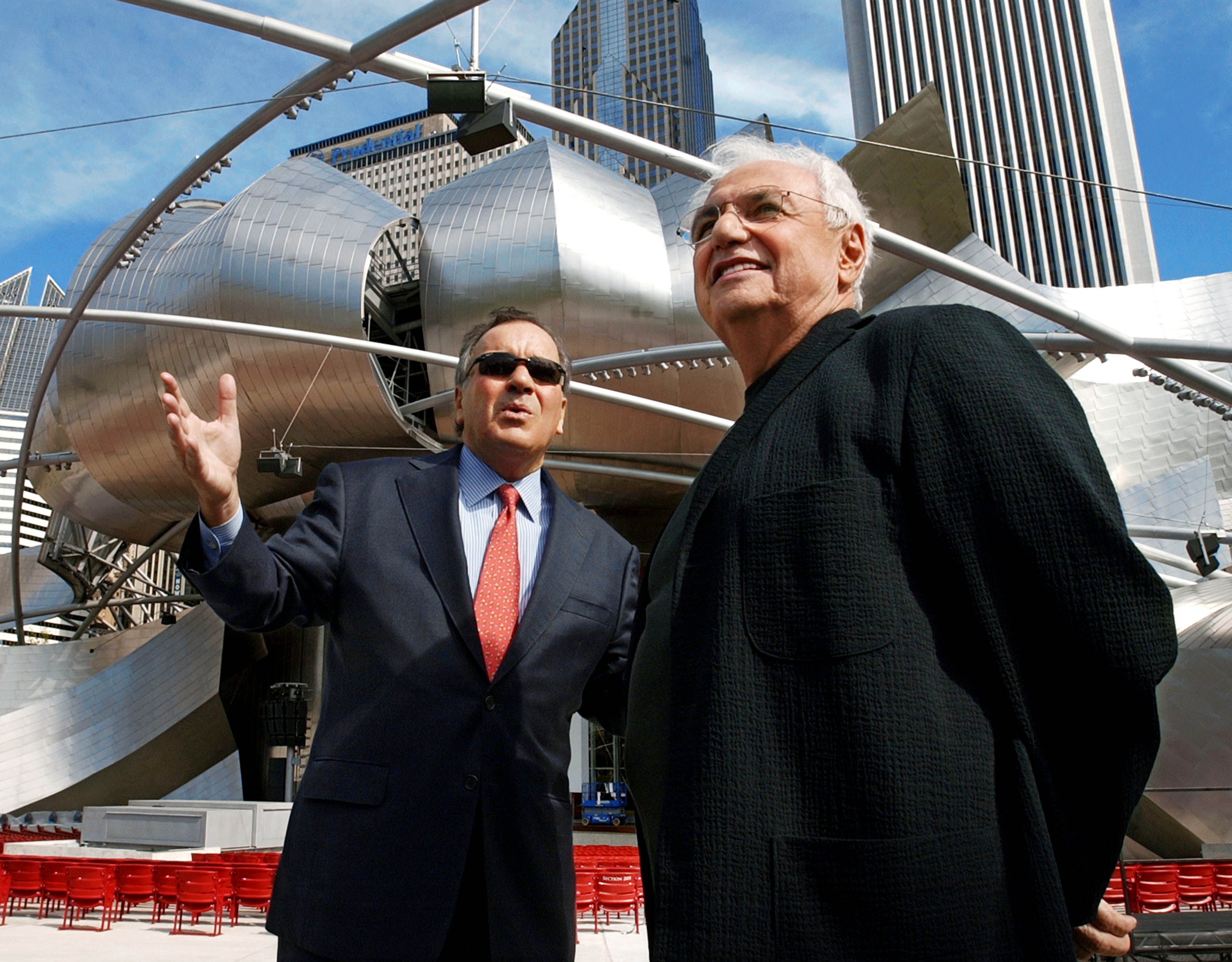 Designed by the eminent Canadian architect Frank Gehry, the Jay Pritzker Pavilion's flame-like façade folds the majesty of Chicago's skyline into a stunning, state-of-the-art concert venue, made to order for the Grant Park Orchestra.
Designed by the eminent Canadian architect Frank Gehry, the Jay Pritzker Pavilion's flame-like façade folds the majesty of Chicago's skyline into a stunning, state-of-the-art concert venue, made to order for the Grant Park Orchestra.
"It completely transformed classical music in the summer," said Carlos. The opening of Millennium Park catalyzed the surrounding neighborhood. Billions of dollars began to flow into Chicago's New Eastside. Restaurants, businesses, hotels, and private residences popped up across the area stretching between Randolph Street and the Chicago River. Today, Millennium Park is the most visited destination in the Midwest.
A New Era
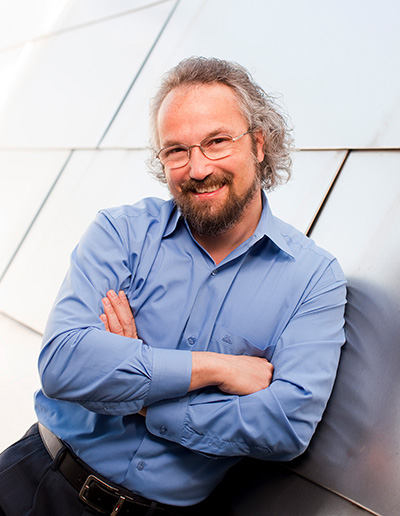 In the coming years, administration of the Festiival fell upon a combination of people from the Park District, the Chicago Department of Cultural Affairs, and the new board. That lasted until around 2010 when Carlos Kalmar dropped in on a board meeting.
In the coming years, administration of the Festiival fell upon a combination of people from the Park District, the Chicago Department of Cultural Affairs, and the new board. That lasted until around 2010 when Carlos Kalmar dropped in on a board meeting.
"He told us the orchestra was operating at the highest level but lacked a comparable infrastructure to support it," said Eileen Friestad, a charter board member. "That's when we realized this board needed to bring the administration up to the level of the orchestra and chorus." And they took that realization to heart.
Over the next decade, the trustees established a more traditional arts organization to administer the Grant Park Orchestra and Chorus. In 2011, they named Carlos Kalmar artistic director. They also brought back Paul Winberg to serve as CEO.
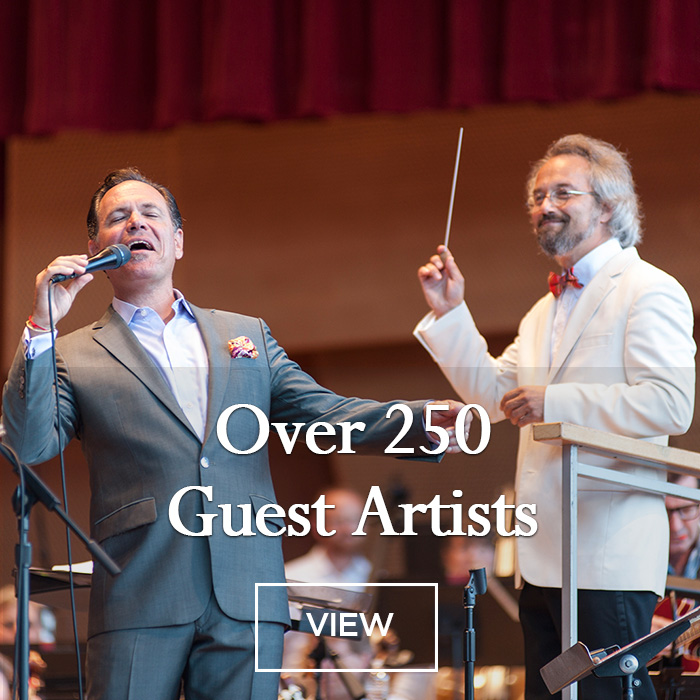 “I was brought in to grow the organization,” said Winberg. (In fact, the Festival’s budget has grown 76% since his arrival.) “The move to Millennium Park was like rocket fuel for our mission,” he said. “But we still needed to hit the ignition switch.”
“I was brought in to grow the organization,” said Winberg. (In fact, the Festival’s budget has grown 76% since his arrival.) “The move to Millennium Park was like rocket fuel for our mission,” he said. “But we still needed to hit the ignition switch.”
Under Carlos and Winberg’s leadership, civic leaders lined up to support an expanded Grant Park Music Festival. With greater resources and higher visibility, they established a summer day camp (Classical Campers) for Chicago youngsters. In their first year together, they commissioned two new works; after that, they began featuring a newly commissioned work each year. At the same time, they doubled down on the forgotten gems of the repertoire.
"Paul came up through the Festival's ranks, and he's a natural ally to Carlos's programming philosophy," said board chair Adam Grais. Across the music world, music professionals began to take note.
"Carlos has a knack for scheduling great classical repertoire and rarely-heard fun surprises."
—Mary Stolper, principal flutist
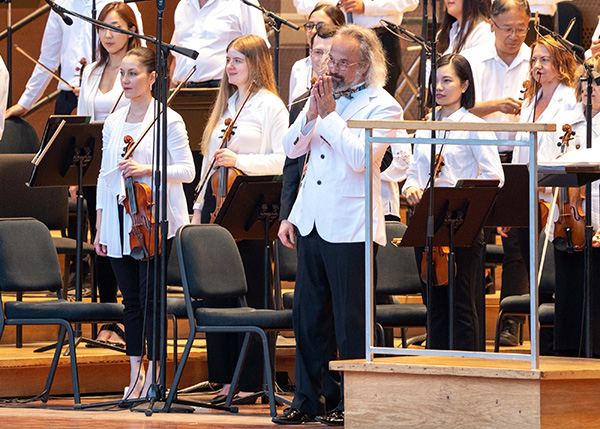 "The summers at Grant Park are always the most work-intensive of my year," said Carlos. "At a time when most artists and conductors try to relax a little bit, I do the exact opposite. I learn between seven and new twelve pieces every summer."
"The summers at Grant Park are always the most work-intensive of my year," said Carlos. "At a time when most artists and conductors try to relax a little bit, I do the exact opposite. I learn between seven and new twelve pieces every summer."
In recent generations, many conductors have dusted off forgotten repertoire, eliciting mixed reactions from audiences. Few have done it with the staying power of Carlos Kalmar.
"Our diverse audiences look forward to the moment he walks on stage," said principal flutist Mary Stolper. "He takes the time to address the audience with a personal viewpoint or story about the music they will hear. They love this personal touch."
My collaborations with Carlos have always been a highlight of my season. His combination of energy, sensitivity, and sheer musicianship have inspired me since the first time we worked together decades ago. I'm sure he will be missed in Chicago.
—Sir Stephen Hough, pianist
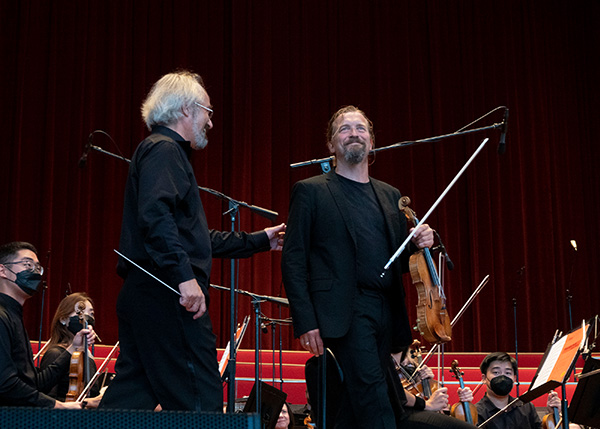 When Carlos Kalmar steps into a roomful of musicians, the good humor and boundless energy become palpable. Over the years, his infectious enthusiasm has brought high-profile allies into the Festival family, including pianist Stephen Hough, violin virtuosos Christian Tetzlaff and Augustin Hadelich, and cellists Johannes Moser and Alban Gerhardt.
When Carlos Kalmar steps into a roomful of musicians, the good humor and boundless energy become palpable. Over the years, his infectious enthusiasm has brought high-profile allies into the Festival family, including pianist Stephen Hough, violin virtuosos Christian Tetzlaff and Augustin Hadelich, and cellists Johannes Moser and Alban Gerhardt.
"Carlos is adventurous," said Winberg. "He looks at the world and sees possibility, which has profoundly impacted the cultural life of this city. Since I've been here, he and I have built relationships with many community organizaitons, from Lyric Opera's Ryan Opera Center to Mariachi Herencia de México. We've worked with local gospel choirs, music schools, the unhoused, and an astronomer from the Adler Planetarium. We regularly play concerts in parks across the city, and we often feature Chicago-based composers, artists, poets, and public figures. Always, it's about putting community together with music and seeing what happens."
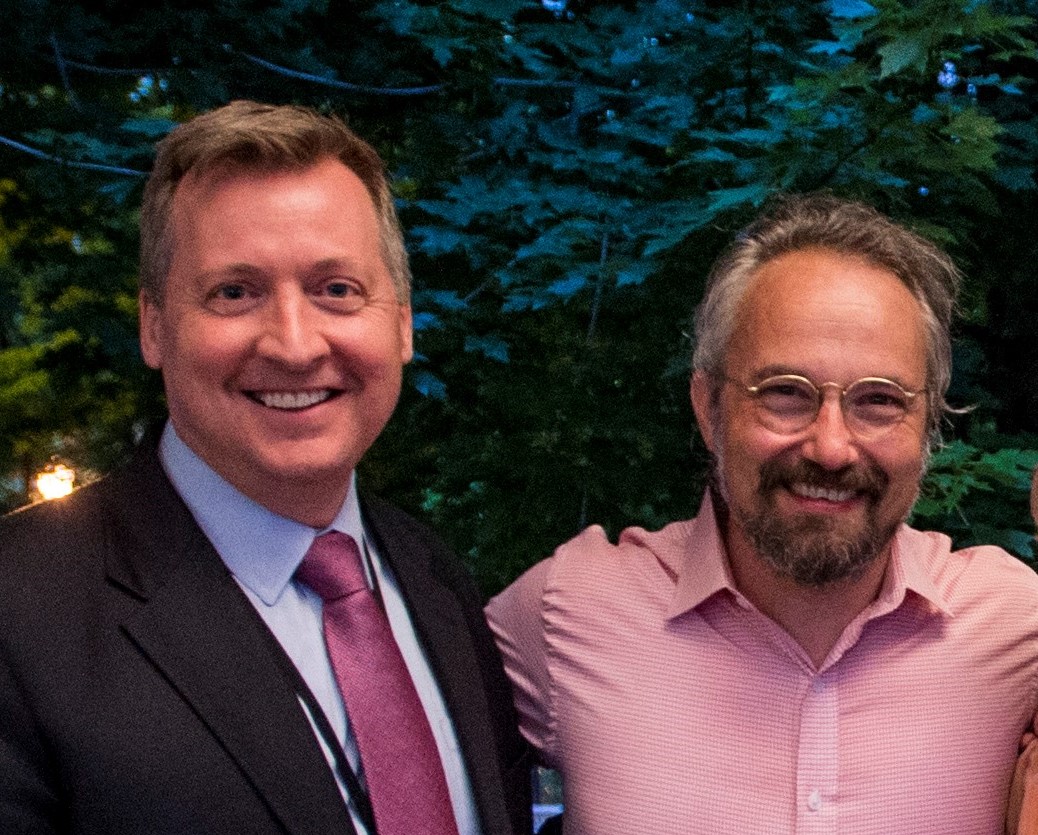 Carlos together with Winberg, and the board, took their next big step in 2013, when they forged a partnership with Chicago Sinfonietta. Through their collaboration, the Festival expanded its footprint in the music industry by creating a program to provide professional job training to young artists of color. Today, the Festival Fellowship has a growing list of alumni who are becoming cultural entrepreneurs in communities across the United States.
Carlos together with Winberg, and the board, took their next big step in 2013, when they forged a partnership with Chicago Sinfonietta. Through their collaboration, the Festival expanded its footprint in the music industry by creating a program to provide professional job training to young artists of color. Today, the Festival Fellowship has a growing list of alumni who are becoming cultural entrepreneurs in communities across the United States.
"The Fellowship alumni are a remarkable group of people. They’re using their gifts to uplift communities,” said Winberg. “They’re becoming social media stars; they’re performing on soundtracks. They’re working with major recording artists, and they’re winning auditions with leading orchestras, including the Detroit Symphony, the Minnesota Orchestra, and the Milwaukee Symphony.”
2020
All the positive momentum in the world couldn't stop a virus. With the world's performing arts organizations shuttering, the Grant Park Music Festival went virtual. Carlos co-hosted a radio series of archival performances on WFMT. Meanwhile, scientists studied the virus and determined it was far less virulent outdoors. In 2021, the Grant Park Music Festival became one of the nation's first choral and orchestral series to return to the stage and moved many people to tears.
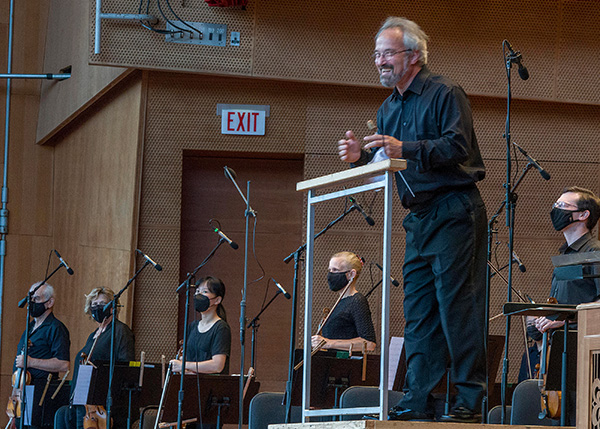 "The first time I really felt it was when we did Brahms Third Symphony," said Carlos. "First of all, I'm very attached to Brahms. And second, to see the effort of the musicians and hear what they are capable of producing and realize this was something I had not done in Chicago for 600 days—that was really quite something."
"The first time I really felt it was when we did Brahms Third Symphony," said Carlos. "First of all, I'm very attached to Brahms. And second, to see the effort of the musicians and hear what they are capable of producing and realize this was something I had not done in Chicago for 600 days—that was really quite something."
While the Festival aspired to present a sense of normalcy, there were many adaptations behind the scenes. The musicians wore masks and sat farther apart—all of which impacted the choice of repertoire. With fewer musicians onstage, Carlos shelved many works in 2021, while others rose to the top.
"Probably every choral piece I conducted [that] season wouldn't have happened in a normal year," said Carlos. "Not because the music isn't worthwhile, but because I typically have more musicians onstage. If you're paying for an ensemble of a certain size, you have to choose music that's appropriate. It's both an artistic and business decision."
Due to the risks associated with viral transmission and air travel, classical singers declined to go back to work, and so all the vocal soloists in 2021 came from the Grant Park Chorus—a testament to their exceptional musicianship.
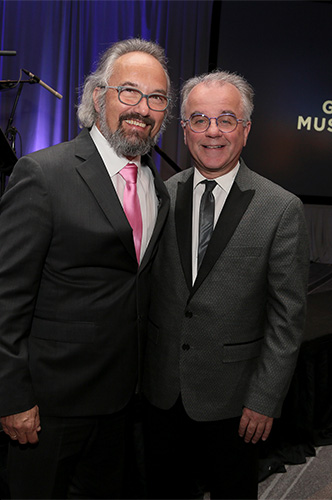 "There were two concerts that were very meaningful to me: Haydn, the Nikolai Mass, and the Schubert Mass in G," Kalmar mused. "This goes back to my youth when I was the chorus director for two churches in Vienna; so, we're talking roughly 1982-83. To revisit this music and to do it with a chorus at this spectacular level—this was very special for me."
"There were two concerts that were very meaningful to me: Haydn, the Nikolai Mass, and the Schubert Mass in G," Kalmar mused. "This goes back to my youth when I was the chorus director for two churches in Vienna; so, we're talking roughly 1982-83. To revisit this music and to do it with a chorus at this spectacular level—this was very special for me."
As it happened, Festival 2021 hit a sweet spot: Tens of thousands of people emerged—seemingly at once—from months of isolation, perhaps with a greater appreciation for the city's cultural assets. And gone was the ability to take live music for granted.
The following two summers saw a gradual return to normal. The Festival Fellowship brought new artists to the Pritzker stage. Management discontinued the onstage Covid protocols, and the wearing of masks became optional. Still, the pandemic changed the social and cultural landscape.
"We've definitely had to adjust, not only adjust, but evolve," said Winberg. "Audiences developed different habits during the lockdown. They got used to staying in, and it's been devastating for some segments of the performing arts, especially theaters. Thankfully, the Festival is back in a position of growth because we’ve been proactive about presenting programs that resonate in contemporary society."
One aspect of this grew out of the 2020 murder of George Floyd at the hands of a Minneapolis policeman.
"It forced the performing arts to reexamine their priorities," said Winberg. "At the Festival, we present free concerts in a public park, so this kind of self-examination—how we serve the community—is good and necessary for us, and in this instance we welcomed it."
In recent years, Carlos and various guest conductors have increasingly presented works by women and people of color, including Jennifer Higdon, William Grant Still, Adolphus Hailstork, Florence Price, Stacy Garrop, Ellen Taaffe Zwilich, Gabriela Lena Frank, Lori Laitman, Jimmy López, Amy Beach, Scott Joplin, Joan Tower, Julia Perry, Anna Clyne, Judith Weir, Jeanine Tesori, Louise Farrenc, Coleridge-Taylor Perkinson, Charles Floyd, Libby Larsen, Xavier Foley, Wynton Marsalis, Billy Childs, etc..
"I think Carlos's hunger for new repertoire has naturally taken us in the direction of programming more works by women and people of color," said Winberg. "But looking beyond his tenure—it’s work that is never finished. I don't think we can ever rest on our laurels."
In the fall of 2023, the Grant Park Music Festival hosted its annual Advocate for the Arts Awards Benefit and raised a record $1,000,000 to support its free programming in Millennium Park—a high-water mark for an organization that has grown its budget by 76% since Winberg arrived in 2011. During the summer, on a good night, the Festival brings in an average of 7,500 people, up from 3,000 back in the days when concerts took place at the Petrillo Music Shell. And the Orchestra and Chorus are playing better than ever.
We have performed pieces that in previous performances elsewhere I have doubted the quality of the piece, and at Grant Park with our quality of musicians and Carlos at the helm the real quality of the music shines through. Call it the Grant Park magic touch.
— Christopher Bell
Now at the end of his tenure, Carlos Kalmar keeps his gaze trained forward, thinking about the next concert and the next piece he’s going to learn—that, and chasing after his young children and grandchildren.
"There's a lot to be said about the magnitude of the Grant Park Music Festival in 2024,” he said. “especially considering the change I’ve seen since I arrived in 1998. Today, we are the classical music Festival in the summer. And if anyone talks about programming, I'd say, ‘Look at us. This is where you can hear the greatest variety of music.’ I sincerely hope that whoever comes after me will preserve and continue to develop what we have built here. There's still a lot of work to do, and I wish them all the best."
By Noel Morris